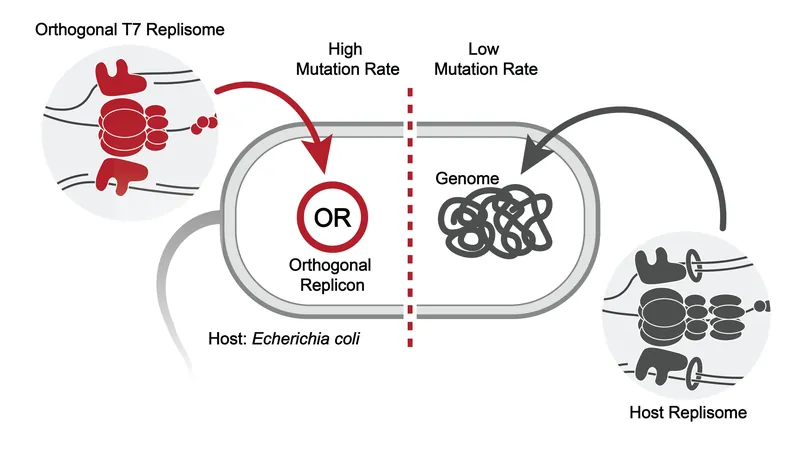
Revolutionary 'Evolution Engine' Supercharges Protein Engineering in Record Time!
2025-08-08
Author: Rajesh
A Game-Changer in Biotechnology
In the fast-paced realm of medicine and biotechnology, the demand for rapidly evolving proteins with enhanced capabilities has surged. Traditionally, this process has been a slow grind, but a groundbreaking new tool from Scripps Research scientists is set to change everything.
Unveiling T7-ORACLE: The Turbocharged Evolution Tool
Introducing T7-ORACLE, a synthetic biology platform that propels the evolution of proteins thousands of times faster than what occurs in nature. Published in the prestigious journal Science, this innovative system is poised to revolutionize the engineering of therapeutic proteins for tackling diseases like cancer and neurodegeneration.
"Imagine having a fast-forward button for evolution!" exclaims Pete Schultz, co-senior author and head of Scripps Research. "Now, proteins can evolve continuously and precisely within cells, eliminating the risk of harming their genomes or engaging in tedious lab procedures."
Say Goodbye to Tedious Processes
The conventional approach involves a lengthy cycle of introducing mutations and selecting improved variants, often taking weeks. Continuous evolution, where proteins develop inside living cells without manual efforts, aims to streamline this arduous procedure. T7-ORACLE raises the bar by implementing a unique bacterial model that significantly increases mutation rates and engineering efficiency.
Engineering a New Evolutionary Pathway
At the core of T7-ORACLE is E. coli bacteria, which host an artificial DNA replication system derived from bacteriophage T7. This design allows for continuous high-level mutation and accelerated evolution of biomacromolecules. Notably, it exclusively targets plasmid DNA, preserving the integrity of the host genome.
By tweaking T7 DNA polymerase to be error-prone, researchers can introduce mutations at an unprecedented rate—100,000 times higher than conventional methods—without jeopardizing the cells.
From Laboratory to Real-World Application
A remarkable demonstration involved inserting a common gene responsible for antibiotic resistance into the T7-ORACLE system. Within a week, bacteria evolved versions of the enzyme capable of resisting antibiotic levels up to 5,000 times higher than the original, showcasing the system's efficiency and relevance.
Limitless Potential for Protein Engineering
But it doesn't stop there! The versatility of T7-ORACLE allows scientists to morph virtually any protein, from cancer-fighting antibodies to therapeutic enzymes, facilitating rapid advancements that once took months.
Diercks emphasizes, "This system can be applied to any protein, accelerating our understanding of various diseases without the complexity typically associated with continuous evolution systems."
A Simple, Scalable Solution
One of the standout features of T7-ORACLE is its compatibility with existing E. coli lab workflows, making it accessible without the need for specialized training or equipment. As Schultz notes, the ease of implementation is a game-changer for researchers looking to harness its potential.
Looking to the Future of Synthetic Biology
With aspirations towards advancing synthetic genomics—potentially evolving polymerases capable of replicating entirely synthetic nucleic acids—the T7-ORACLE platform is just the beginning. The current focus is on refining human-derived enzymes for therapeutic use and customizing proteases for cancer-related proteins.
"T7-ORACLE seamlessly merges rational design and continuous evolution, paving the way for unprecedented discoveries in functional molecules," Schultz concludes.

 Brasil (PT)
Brasil (PT)
 Canada (EN)
Canada (EN)
 Chile (ES)
Chile (ES)
 Česko (CS)
Česko (CS)
 대한민국 (KO)
대한민국 (KO)
 España (ES)
España (ES)
 France (FR)
France (FR)
 Hong Kong (EN)
Hong Kong (EN)
 Italia (IT)
Italia (IT)
 日本 (JA)
日本 (JA)
 Magyarország (HU)
Magyarország (HU)
 Norge (NO)
Norge (NO)
 Polska (PL)
Polska (PL)
 Schweiz (DE)
Schweiz (DE)
 Singapore (EN)
Singapore (EN)
 Sverige (SV)
Sverige (SV)
 Suomi (FI)
Suomi (FI)
 Türkiye (TR)
Türkiye (TR)
 الإمارات العربية المتحدة (AR)
الإمارات العربية المتحدة (AR)